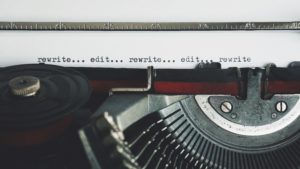 A good book is filled with great writing—a great book is filled with exceptional editing.
A good book is filled with great writing—a great book is filled with exceptional editing.
While the writing process is often the most enjoyable aspect of creating a story, editing is where the work really comes to fruition.
Simply put, editing is the process of re-reading the work, fixing mistakes in spelling and grammar, and generally improving the quality of the piece. It is important to note that the majority of editing is not adding huge blocks of passages to the work, but instead pruning it down and tidying it up so that the work can be in its best possible form before being published.
The process of editing begins once the entire piece has been completed. When editing, the best way to double-check your work is to have someone else read it—and preferably take notes. There may not always be someone around to help, however, which is where ‘self-editing’ happens.
Although (much like writing itself) the process of editing is different for everyone, I have personally found that taking a few hours, or even a few days away from the piece really helps one to come back with a fresh perspective. When you can come back to your work without the detail-oriented focus of the writing process, you can read the work as a whole, and engage with it on a more distanced level.
There are four main items that one ought to focus on when editing: grammar, punctuation, spelling, and style. Grammar, punctuation, and spelling are more rule-driven; i.e., if a verb is used that requires a ‘complementary infinitive’, such as the verb ‘ought’, the sentence is incomplete without the infinitive. For example, “I ought to the store” is incomplete, as the infinitive, “to go,” has been left out. Likewise, spelling is subject to English’s wild and wonderful world of spelling rules, and punctuation is driven by its rules.
These first three items may appear to be frightening on paper, but everything boils down to one question: Does what you are writing make sense? From there, the remaining questions follow neatly: Is everything spelled correctly, and supplied with the correct punctuation? Are there any fragments, or extra spaces, doubled words or typos?
Oftentimes, the best way to edit for these is to print out the piece, take a red pen, and mark each and every mistake or area that needs to be fixed, making plenty of notes along the way. Once that is done, take the notes back to the original work, and make the changes.
The fourth item, style, is a bit more difficult to pin down to a single definition and must be learned through practice and acknowledging mistakes. Style is the general flow of the work, and is subject to the desires of the author, and how he or she naturally writes or seeks to convey via the use of sentence structure, vocabulary, and the like. Steven King, for example, prefers to use short clips and phrases from a character’s inner monologue as tiny, standalone paragraphs, which gives his work a very real and visceral feeling to the reader, as if the reader is experiencing the events simultaneously alongside the character.
Style is not something that is easily edited but is instead developed over time and should be passively considered when editing a work.
Along with self-editing, there are also resources available to writers explicitly focused on improving one’s work, i.e., visiting your local college’s writing center, a library, or, for a more focused option, attending a writing workshop. In a writing workshop, you can not only address issues in your own work, but also learn about new techniques in editing, proofreading, and, of course, writing.
A writing workshop also provides an opportunity for the most crucial aspect of editing a piece: peer advice. The more a work can be read from different perspectives, the stronger it becomes as a whole, and being in a like-minded environment often offers some of the best opportunities for both professional and peer advice.
Editing is a process that can be repeated multiple times over a piece but take heed: it is entirely possible to ‘overwork’ a piece. Much like a painting, there comes a point where a piece has been ‘worked’ over and over, to the point where the original spirit of the piece has been lost to the editing. This is a case where taking a few days away from the work or having a colleague edit would be much more beneficial than ending up with a work that sounds robotic. The goal of editing isn’t to create the ‘perfect’ piece—arguably, no writing is ever ‘perfect’—instead, the goal is to convey to the reader, as accurately as possible, what you, the author, would like the reader to know; communication is the goal, and language is the conduit; editing is the bridge between the two.




